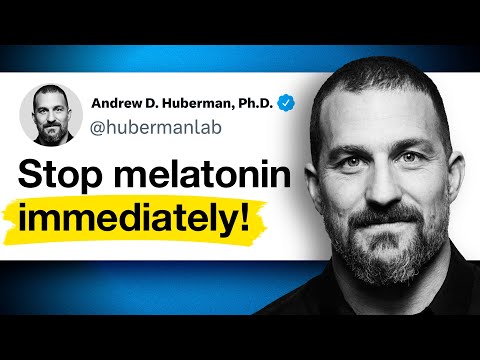FWIW
I will be going back to taking 180mg{yes 180mg, as per Shallenberger and Reiter] per day.
@Joseph @John_Hemming Does exogenous melatonin get into cells or into mitochondria to act as an antioxidant on ROS? What keeps the mitochondria from making the melatonin it needs? Can too much melatonin acting as an antioxidant diminish the signaling effect (thought to be good) of exercise?
I have taken modest (1-10mg) doses of melatonin for many years. Whenever I have dabbled in higher doses I have short term benefits but then sleep disruptions drive me back to my old patterns. I am curious about whether there is a benefit of big doses, and if so how to get it without wrecking my sleep.
The person to ask these questions to;
Melatonin like many metabolites is something where the timing of dosing matters as well as the quantity.
It is best taking this to the Megadose topic.
He is definitely worth interviewing, but I am not sure he has spotted the significance of the sheep experiments cited in the paper I put on the Megadose thread.
A proportion, probably the majority, possibly all of pineal melatonin is injected initially into the CSF. This has considerable timing implications on sleep simply because the CSF turns over roughly every 5 hours.
If the interview comes together, I’ll put those papers into the prep work. Thanks.
I upped my nightly dose of melatonin based on some research after reading John_Hemming’s use of high-dose melatonin.
Melatonin in of itself does not cause sleepiness, it merely adjusts or resets your biological clock.
I too expected very high doses of melatonin to cause daytime sleepiness, but for me, it did not.
So, I think your daytime sleepiness after taking high dose melatonin may be psychological because you expected it to cause daytime sleepiness.
I have never experienced daytime sleepiness from taking melatonin at any dose.
It depends when you take it.
I have moved from between 500mg to 1g of melatonin for a while so I can see the impact on my next sets of blood tests (these are weekly and I am next scheduled for a blood draw on wednesday).
There is no question that melatonin helps with oxidative stress and the consequential outcomes (cancer etc). However, I need to understand its broader effects including on SHBG.
My daytime sleepiness comes from a lack of sleep. When I take larger melatonin doses before sleep, i wake up in the middle of the night. If i don’t fall back to sleep then my day begins at 3-4am. By mid-afternoon, I can feel it. If I take caffeine to help the afternoon, then I’m not going to sleep until late unless I try the melatonin again…and around and around she goes. I haven’t had the nerve to try a big melatonin dose at 3am but perhaps that is the experiment to try.
I believe that is when John Hemming takes a big dose when he wakes up at night.
Waking up in the middle of the night, middle insomnia needs an understanding of sleep cycles. It is best to wear a fitness/sleep tracker to see when you wake up. You need to recognise that probably the CAR (Cortisol Awakening Reponse) has kicked in. Hence you won’t get back to sleep until the next sleep cycle kicks in - normally 90 mins ish later.
If the next cycle kicks in in sympathetic mode you won’t sleep, but if it is in parasympathetic mode you might.
There are various ways of affecting this, my preferred route to take night time melatonin about 45-60 mins after waking in a middle insomnia sleep cycle. Because melatonin has a really short serum half life you need to make sure that it is not running out as you switch from one cycle to the next (this may mean taking it at 45 mins, 60 mins, 75mins and 90 mins. However, that should create an hour or two’s additional sleep and no day time sleepiness.
If, however, you are reading your phone as you switch from one cycle to the next then it won’t let you sleep. Orange glasses help, but the main thing is getting the sleep cycles right.
I never take melatonin before I go to sleep because when it runs out it creates the CAR. it also undermines endogenous production.
Most time release melatonin does not understand the interplay between the CSF melatonin storage and serum melatonin.
In another thread on this forum their are link’s’ and copies of Shallenberger articles and slide presentation and a link to a PDF copy of Reiter Professional Medical book on Melatonin.
See ;
This is the standard medical establishment view on melatonin. It ignores the issue about how much melatonin goes into the CSF (see the Melatonin megadose thread).
I do agree witth Andrew Huberman in that melatonin has anti puberty effects. Exactly what this means is more complex. I have five children and don’t intend to have any more so I have not checked whether or not it has any effect on fertility.
Review
“Dr. Russel Reiter on the Miraculous Benefits of Melatonin”
Direct from the Master of Melatonin,
Dr. Russel Reiter
And
“Optimizing Oxidation in the Care of Chronically Ill Patients”
Frank Shallenberger, MD
A Medical Doctor who personally uses what he prescribes to his patients.
Joseph, consider taking 6 mg. for example in two parts. 4 mg just before bedtime and 2 mg at 3 ish when you wake up. This has worked for me for many years. Johnmacc
Thanks. For the last few days I’ve been successful in not taking any melatonin before sleep, and only taking it when I wake up at 2-3am. But I’m still getting up at 2-3am. Would your method work better to keep me from waking up at 2-3am?
Stop cold from drinking water or any drinks after 5-7 PM then you’ll sleep through the night. Plenty of time during day to drink water/hydrate.


